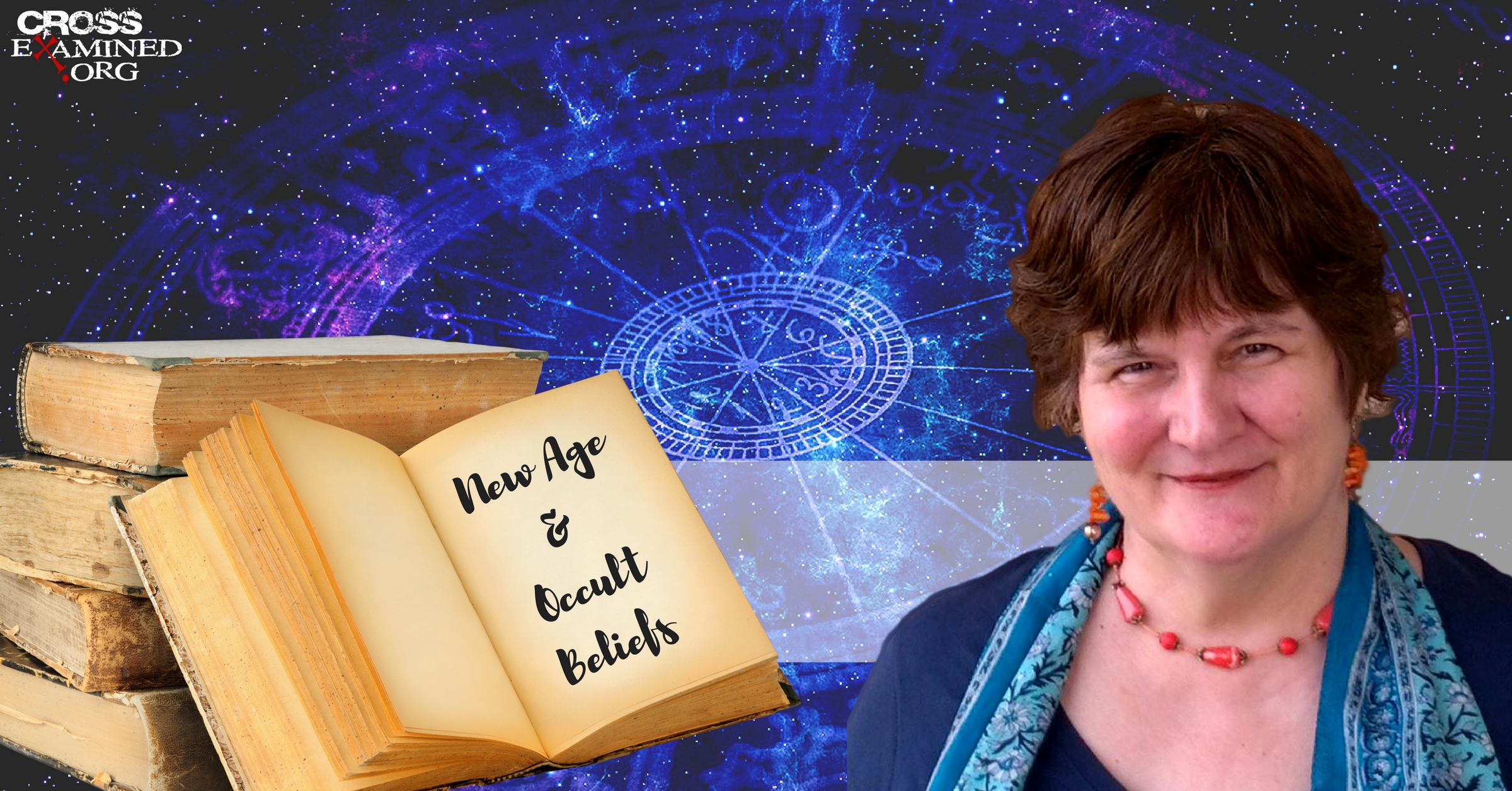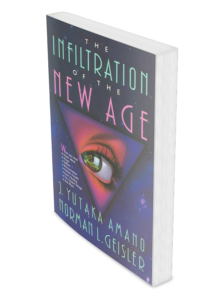I’m excited to share an interview with Marcia Montenegro!
Marcia was involved for many years in Eastern and New Age beliefs, and was a licensed professional astrologer. She became a Christian in 1990 and today has a ministry called Christian Answers for the New Age. Her ministry exists to 1) educate Christians about the New Age and occult so they can be more discerning and equipped to witness, and 2) reach people in the New Age and the occult with the love and truth of the Gospel. Marcia has a Masters in Religion from Southern Evangelical Seminary and is a missionary with Fellowship International Mission. She has spoken in 30 states, is a frequent radio guest, and has published articles in several Christian publications. She is the mother of an adult son, and is the author of SpellBound: The Paranormal Seduction of Today’s Kids.
I had the opportunity to ask Marcia several questions on what Christian parents need to know about New Age and occult beliefs. This is an area I personally knew very little about before doing this interview. I learned a lot, and I know you will too! As Marcia explains, your kids are probably exposed to these beliefs more than you realize.
1. Marcia, can you start by telling us a little about your own journey from being a professional astrologer to becoming a Christian?
I was deeply involved in the New Age and followed Eastern spiritual teachings (Hindu, Buddhist, and Taoist) for many years. I also practiced and taught astrology. I was very hostile to what I viewed as narrow-minded Christianity. In the year I ended my term as President of the Astrological Society in Atlanta, I suddenly experienced a compulsion to go to church. This led me to attend a (very open-minded) church several months later, where I amazingly experienced the feeling of God’s love pouring down on me (from a personal God I didn’t even believe in!). I then gave up astrology. I eventually encountered and began trusting in Jesus while reading the Gospel of Matthew. All of this took place over just 8 or 9 months!
2. Can you help parents understand exactly what “New Age” means, and why New Age ideas are so appealing to young people?
The term “New Age” covers a broad ground and can be difficult to define. The New Age itself doesn’t even use the term “New Age!” The more popular term is “spirituality” – someone forming their own spiritual path. That type of path is usually New Age or partly New Age.
But here is how I define New Age: It is a network of beliefs whose roots are Gnostic, Eastern, and New Thought.
The Gnostic part values spiritual above the material/physical; the material is merely a manifestation of the spiritual, so everything is spiritual. In New Age views, the body is a manifestation of the spiritual state.
The Eastern beliefs of Taoism, Hinduism, and Buddhism contribute several ideas to the New Age: principles of reincarnation, an impersonal source that we all come from and go back to, the view that this world is not ultimately real, the claim that there are no absolutes (all spirituality is subjective), and the need for Eastern-based meditation to achieve spiritual understanding or awakening.
Finally, the New Age draws heavily from New Thought, which includes the belief that Jesus came to correct wrong thinking and model how to achieve Christ Consciousness, the awareness of our innate divinity. New Thought also teaches that one’s thoughts and words can bring one’s desires into reality via certain techniques. The bestselling book, The Secret, is a classic example of New Thought. New Thought claims to be Christian and often sounds like it. It is very deceptive.
You can find people in the New Age anywhere along this spectrum from Gnostic to Eastern to New Thought, as well as many who combine these beliefs. Additionally, the New Age adopts some occult views and practices (see my response to the next question.)
The New Age can appeal to young people for several reasons. One is because it is very different from the Judeo-Christian worldview, which makes it intriguing. Another is that it seems to offer ancient wisdom, since Eastern and pagan beliefs were established before Christianity. Some areas of the New Age emphasize the power or divinity of the female, and draw women in that way.
One of the chief appeals is that the New Age is experiential in nature, so what a person experiences and feels is highly valued over objective truth. This allows you to have a customized spirituality, which is especially appealing to young people.

3. Could you also define the occult and explain how occult ideas relate to New Age ideas?
The occult is a set of practices based on Deuteronomy 18:10-12, where God lists and denounces all of them. They are divination (often called fortunetelling), spirit contact, and sorcery.
Divination is the practice of gaining information by reading hidden meanings in nature or patterns (for example, astrology, tarot cards, numerology or palm reading) or via supernatural means (for example, psychic powers).
Spirit contact is seeking information or guidance from disembodied beings, who are believed to be ghosts (dead people), aliens, ascended masters, angels or deities from non-Christian religions.
Sorcery (today usually called ritual or ceremonial magic) involves using the will to bring about a desired end through incantations, rituals, magical tools, contact with spirit beings, and/or the manipulation of powers or energies.
Although many New Agers use occult practices or consult those in the occult, the New Age and occult worldviews differ. The New Age is transcendent and future-oriented; the person is always seen as evolving toward a goal, learning lessons, and eventually being liberated from this life and reality.
The occult is more here-and-now oriented, is more pragmatic in nature, and focuses on the practical use of one’s energy and/or nature’s energy to manifest happiness and results.
As a general disclaimer, New Agers and occultists disagree amongst themselves on their beliefs, and certainly some would likely disagree with my descriptions as well.
4. In your experience, what are the dangers of kids getting interested in these ideas?
My two main concerns are desensitization and glamorization. I believe that the massive amounts of books, TV shows, and movies that promote occultism and heroes/heroines who have occult powers have desensitized the culture as a whole. No longer is it seen as a bad thing for a child to pretend to cast spells, for example; now that is viewed almost endearingly. It is easy to become desensitized to the fact that these activities are evil.
Ultimately, being desensitized can lead to acceptance of New Age or occult beliefs, which in turn can lead to disinterest in or rejection of what God has to say about false beliefs. That acceptance can lead to active participation in New Age or occult practices.
5. Most parents probably aren’t aware of how New Age or occult ideas might touch their kids. Can you give us examples of where kids might encounter New Age or occult ideas in popular culture today?
One of the most popular ways is the Ouija Board, made by Parker Brothers and sold in toy stores. It was originally designed by a Spiritualist as a tool for contacting the dead. The dead cannot respond to us, but fallen angels can and do. They don’t care if you are using the Board as a game. A well-known series of books, the Seth series, came about from the author’s initial contact with an entity calling itself Seth via the Ouija Board. Seth eventually began to speak directly through the author, Jane Roberts, while she was in a deep trance state, and these messages formed the book series (the first one influenced me deeply as a New Ager). There are other cases of people who channeled teachings after using a Ouija Board. It’s not simply a game.
Probably the biggest purveyor of occult concepts is the media: television, video games, and movies which emphasize stories where the hero or heroine wields supernatural powers. Some of these abilities are harmless fantasy (e.g., X-ray vision), while others involve casting spells, using psychic powers, or even contacting spirits. It is common for books and movies to mix fantasy with the occult, further confusing the problem.
Parents often want a list of media to avoid, but it is impossible to maintain such a list. Ideally, parents need to understand Deuteronomy 18:10-12 so they can recognize occult ideas and teach their children to be discerning.
I offer parents a resource for this in my book, SpellBound: The Paranormal Seduction of Today’s Kids (2006), which is now on Kindle and is an e-book on sites such as Barnes & Noble and Christianbook.com. This is a guide for parents (and others) that offers suggestions on how to talk to children about these areas and how to answer objections.
6. What do you feel is the best way to handle New Age/occult exposure with your kids? What should parents say?
My concern is not so much that a TV program or book contains New Age/occult ideas as it is that a program or book glamorizes or promotes them.
A lot depends on the age and maturity of the child. I would say that kids under age 12 should have no exposure to books or media that promote occult ideas, no matter how mildly. At this age, children don’t yet have critical thinking skills and they emotionally identify with the heroes.
For early teens, be very selective and discuss any questionable material that pops up. I would completely avoid books or programs that have a focus on occult themes or have heroes who blatantly practice occultism.
For older teens, there is less control, of course, but if you discover they are reading or have watched something that promotes occult or New Age ideas, have a discussion with them. Ask them what they think of it, show them Scripture, and help them understand it is a fallen world that is under the sway of the evil one (1 John 5:19). Evil things will be accepted and even admired by the world, but that doesn’t make them harmless.
In my book for parents on the occult, I give suggestions at the end of each chapter on how to talk to your children about that chapter’s particular topic.
7. If there are parents reading this whose kids are already involved somehow in New Age/occult ideas, what resources do you recommend to help them?
I have articles on the occult on my website at www.christiananswersforthenewage.org. Also, aside from my book, there is Jeff Harshbarger’s From Darkness to Light: How to Rescue Someone You Love From the Occult.
For older teens and parents, a resource explaining biblical miracles versus occult paranormal activities is Norman Geisler’s book, Signs and Wonders: Healings, Miracles, and Unusual Events: Which Are Real? Which Are Supernormal? Which Are Counterfeit?
If your child is getting interested or involved in the occult, it is imperative to have a talk with him or her. Don’t postpone it or hope it goes away. At the same time, don’t show fear of it. Ask questions, use Scripture to show why these areas should be avoided, and make it clear you will not allow occult materials in the home. Be low-key about it, but firm. It is your home and your responsibility to guide your child in the wisdom of the Lord.
Visit Natasha’s website at ChristianMomThoughts.com
Resources for Greater Impact:




 INFILTRATION OF THE NEW AGE
INFILTRATION OF THE NEW AGE














Facebook Comments